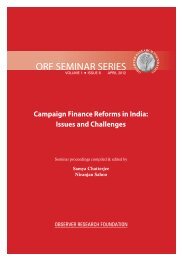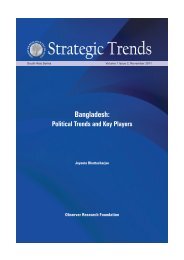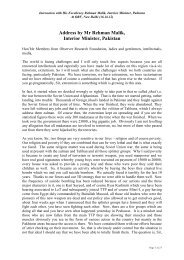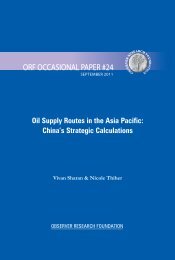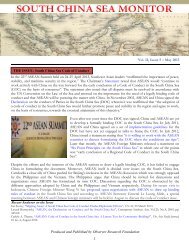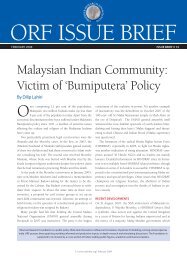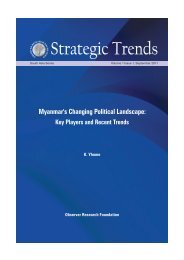ORF ENERGY NEWS MONITOR - Observer Research Foundation
ORF ENERGY NEWS MONITOR - Observer Research Foundation
ORF ENERGY NEWS MONITOR - Observer Research Foundation
You also want an ePaper? Increase the reach of your titles
YUMPU automatically turns print PDFs into web optimized ePapers that Google loves.
Sheikhan # 01, located in District Kohat of Khyber Pukhtoonkhawa. The gas is of good quality with 96%<br />
methane and 1041 BTU / SCF heating value. The discovery will add to hydrocarbon reserves base of the<br />
Company and joint venture partners.<br />
TOP<br />
OPEC forecasts oil demand to increase 1.2 pc next year, led by China, India<br />
July 15, 2010. The Organization of Petroleum Exporting Countries forecast that global oil demand will grow in<br />
2011 at about the same rate as this year, led by developing economies such as China and India. Worldwide<br />
crude oil consumption will increase by 1.05 million barrels a day, or 1.2 percent, next year to average 86.41<br />
million barrels a day, the organization’s Vienna-based secretariat said today in its first assessment for 2011.<br />
This year OPEC predicts demand will grow 950,000 barrels a day, or 1.1 percent driven by countries outside<br />
the Organization for Economic Cooperation and Development. Crude demand is recovering around the world<br />
from a two-year slump, the steepest since the 1980s, triggered by the financial crisis and ensuing recession.<br />
OPEC, responsible for 40 percent of global oil output, is anticipating less demand growth next year than the<br />
adviser to consuming OECD nations, the International Energy Agency. IEA forecast that oil usage will advance<br />
1.3 million barrels, or 1.6 percent, to 87.8 million a day in 2011. OPEC predicted that producers outside the<br />
group will expand their supplies in 2011 by less than this year’s shipments. Non- OPEC suppliers will increase<br />
output by 300,000 barrels a day to 52.2 million a day, the organization said. That’s down from forecast growth<br />
for this year of 700,000 barrels a day. As a result, the world’s need for crude from OPEC will increase. OPEC<br />
expects it will need to pump an average of 28.8 million barrels a day in 2011 to balance supply and demand, or<br />
200,000 a day more than this year.<br />
Colombian armed forces to help scout for new oil reserves, General says<br />
July 14, 2010. Colombia plans to use its armed forces to help scout for new reserves of crude as it seeks to<br />
push output to a record, the commander of the armed forces said. South America’s third-largest oil producer<br />
after Venezuela and Brazil is training a military unit to help perform seismic testing to locate potential reserves.<br />
Until now, the armed forces only deployed soldiers to protect companies exploring for crude and at production<br />
sites. The strategy will speed Colombia’s search for oil as improved security spurs investment even in remote<br />
swaths of jungle. Since 2002, President Alvaro Uribe has increased military strikes to drive guerrilla forces from<br />
areas once considered too risky for oil and metals exploration. President-elect Juan Manuel Santos, who takes<br />
office Aug. 7, has pledged to maintain those security policies.<br />
Downstream<br />
CNPC to begin refinery construction in Syria in 2011<br />
July 19, 2010. China National Petroleum Corporation announced that it will begin construction of a longdelayed<br />
US$2 billion refinery in Abu Khashab, Syria, during the second quarter of 2011. The refinery will be<br />
located near the oil hub Dayr az Zawr, Syria, some 450 kilometers northeast of Damascus. When complete and<br />
operational in 2014, the refinery is expected to handle between 70,000 and 100,000 barrels of crude oil per<br />
day. The crude feedstock will be supplied by nearby fields. When the project was originally announced in 2008,<br />
it was expected to be completed in 2011. However, it was delayed because of the global economic crisis.<br />
CNPC will assume 85 percent of the total cost of the project, while the Syrian government will take<br />
responsibility for the remaining 15 percent. The governments of Syria and China have made it clear that they<br />
hope to strengthen their international ties by developing upstream oil exploration and oil refining. CNPC,<br />
China's largest oil and gas producer, is the state-owned parent company of PetroChina Company Limited. TOP<br />
NNPC, Chinese investor to build refinery in Nigeria<br />
July 19, 2010. To strengthen domestic refining capacity and enhance sustainable fuel supply in the country,<br />
the Nigerian National Petroleum Corporation (NNPC) and China State Engineering Construction Corporation<br />
(CSECC), are in talks to constrict a greenfield refinery in Kogi State. The proposed Greenfield Refinery would<br />
be integrated with an industrial hydrocarbon park designed to convert natural gas and refined petroleum<br />
products into hydrocarbon derivatives. Among the numerous benefits of the greenfield refinery is not only in<br />
the state’s economic expansion through rapid industrialisation, but also the creation of thousands of new jobs.



